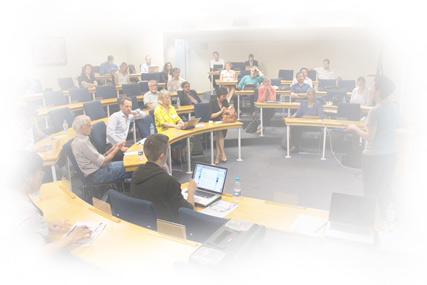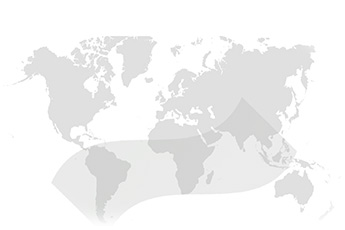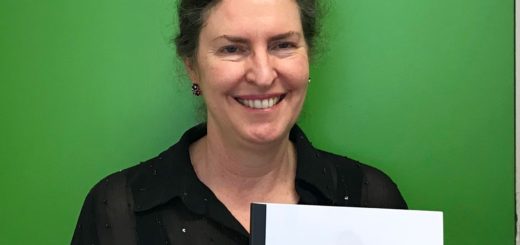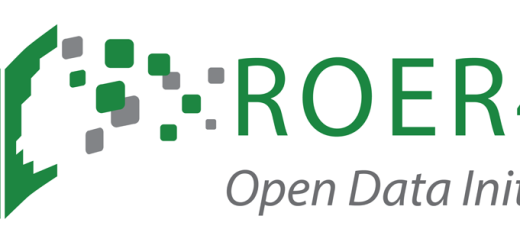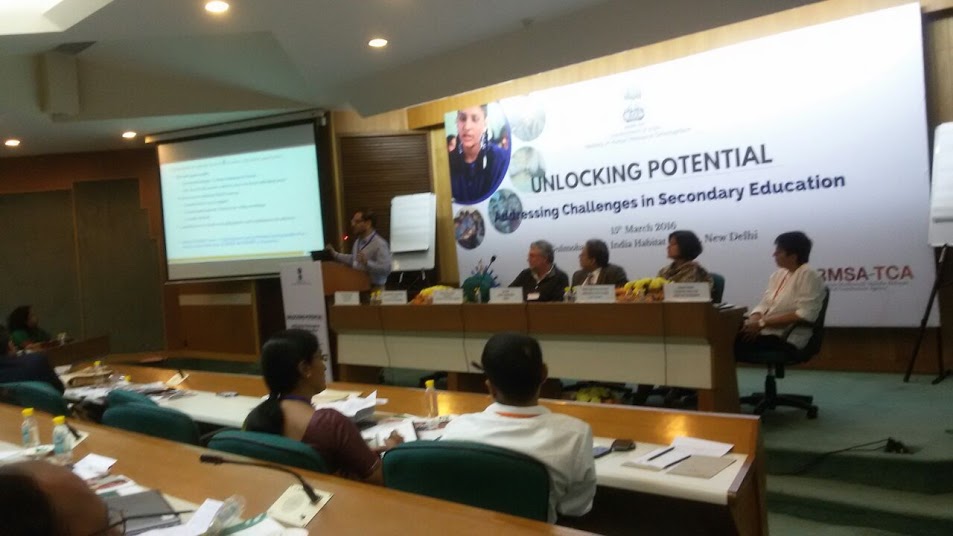
Gurumurthy Kasinathan at the Ministry of Human Resource Development conference, March 2016 (photo credit: Guru Kasinathan)
In this post, Gurumurthy Kasinathan reflects on implementing a professional learning community model of teacher education to adopt OER in Karnataka, India, and how formative evaluation, and dissemination of the research through conferences is leading to greater awareness and take-up within the Indian educational system. The wider impacts include plans for adoption of the OER adoption based model for teacher professional development in other states.
India has a large government (public) school system, which supports universal access to education. However, many studies and assessments reveal that the quality of educational provision is a serious issue. One cause of poor quality is what is known as ‘text book’ culture whereby teachers only transmit topics from the text book (which is provided free of cost to all teachers and students by the government). Memorizing and reproducing the text book content is therefore seen as learning rather than understanding the concepts behind the content. Because of this approach, students who perform well in school examinations are unable to respond to application based assessments.
Secondly, teacher education programs are largely not based on need assessments and are implemented in a didactic manner, similar to the way in which students are taught. Teacher education comprises almost entirely of point in time workshops, and there is a lack of continuous professional engagement, seen critical for learning. Poor quality teacher education contributes to poor quality school education.
Information and Communication Technologies (ICTs) are seen as possible tools for addressing the quality of education issues; however, ICT programs have largely tried to bypass teachers and transmit centrally created content across diverse socio-educational contexts, which has limited their effectiveness. Open Educational Resources (OER) can serve to complement and supplement curricular resources, which can enable deeper and broader understanding of a topic, yet OER are not popular in the Indian government school system. Teachers are not familiar with digital technologies which are required for accessing OER; teachers see themselves as passive ‘consumers’ of content, so do not take efforts to look for OER. Furthermore OER are usually not available in the Indic languages which form the medium of instructions in most government schools.
The professional learning community based OER adoption project for teacher education
As a response to these contextual factors, one approach is to consider the professional learning community (PLC) model of teacher education which allows for continuous interactions and peer learning amongst teachers. By making the access, creation, revision and sharing of OER an objective of these PLCs, the nature of the teacher education can also be improved.
At IT for Change (ITfC), we designed and implemented a PLC based OER adoption project, using an action research methodology, in Karnataka state, India, as a part of the ROER4D research project (Sub-project 5). In the ‘Subject Teacher Forum – Karnataka Open Educational Resources’ project, ITfC trained 67 Mathematics, Science and Social Science high school teachers and teacher educators on OER creation, sharing and adoption processes. This group was embedded within a larger professional learning community (PLC) of around 13 000 teachers across Karnataka, developed through the ‘Subject Teacher Forum’ (STF), an in-service teacher education programme in the public system. In the project, ITfC trained the teachers to access, create and revise OER in English and Kannada, using a wide variety of free and open source authoring and editing software applications. Over a three year time frame, the 67 teachers, with support from the wider PLC, were able to create OER for their subjects and share them on the virtual forums.
Familiarity with ICTs, access and creation of OER and networking for peer learning are clear benefits seen from this participatory OER program. The project was implemented as a part of the regular in-service teacher education program of the education department of Karnataka, so it has high visibility and acceptance amongst the education officials in the state. The project was funded by the Rashtriya Madhyamika Shiksha Abhiyaan (RMSA), a Government of India program for secondary education and UNICEF. The design and implementation model of the project has made it ‘systemic’ meaning that an education department in any state government can implement a similar program with its own infrastructure, resources and teachers.
A review from the Ministry of Human Resource Development (MHRD), Government of India and a formative evaluation conducted by RMSA emphasized the technological, pedagogical, and content benefits from this project. This has helped to create a positive impression of the project and emphasized both the possibility and benefits from implementing a similar program in other states.
Promoting effective models of teacher professional development
Recognizing the need to promote effective models of teacher professional development, the MHRD invited me to a one day national conference on secondary education under the theme Unlocking potential – addressing challenges in secondary education, in New Delhi, where I presented the OER project in Karnataka in a session on Continuous Teacher Development: “Current challenges in implementing in-service teacher training practices and future trends in professional development of teachers”. Participants included MHRD policy makers, State Education Secretaries and Directors, officials of State education departments, State Secondary Education Boards, University Departments, Civil society and International Development Agencies.
The conference was an opportunity for government and non-governmental stakeholders working in the field of education to engage in exploring critical challenges, expert discussion and developing shared insights to improving equity, learning and efficiency in secondary education. Based on the presentation and discussions, officials from the states of Nagaland, Sikkim and Andhra Pradesh expressed their interest in exploring a similar program with their schools. Assam and Telangana are already planned to implement similar programmes in their states. The project therefore continues to have wider impacts within the Indian educational system.
